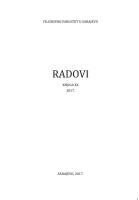OD SATIRE, PREKO LAKRDIJE, DO REALISTIČKE KOMEDIJE, TRAGIFARSE I "TUŽNOG KOMADA“ - "ŽENIDBA" NIKOLAJA VASILJEVIČA GOGOLJA NA SARAJEVSKOJ POZORIŠNOJ SCENI
FROM SATIRE AND RIDICULE TO REALISTIC COMEDY, TRAGIFARCE, AND "SAD-PLAY“ - GOGOL’S "MARRIAGE" ON SARAJEVO THEATRE STAGES
Author(s): Adijata Ibrišimović ŠabićSubject(s): Theatre, Dance, Performing Arts, Language and Literature Studies, Studies of Literature, Russian Literature, Theory of Literature
Published by: Filozofski fakultet Univerziteta u Sarajevu
Keywords: Gogol; reception; theatre stage; comedy; satire; caricature; humour; tragifarce; "Marriage“;
Summary/Abstract: This article draws upon my research into a number of concepts underlying Sarajevo theatrical productions based on Nikolai Vasilievich Gogol’s works. Speciϐically, the article is focused on the contrastive analysis of the theatrical and literary critics’ responses to the plays following their theatrical staging, on the one hand, and the literary and theoretical texts addressing the key themes of Gogol’s corresponding works written by both Russian and Bosnian-Herzegovinian critics and theorists, on the other.The research shows that Gogol’s comedies, much like Chekhov’s plays,have in time become independent „matrices“; or scores upon which plays(and interpretations) are produced as variations of the subject. These types of artistic texts not only allow but also invite the reader to act as aco-author for Gogol’s texts constitute true storehouses of multi-layered connotations, drawing a number of political and cultural parallels and communicating complex meanings on the philosophical, metaphysical,and irrational planes. The broad spectrum of receptions of and responses to Gogol’s comedies in Sarajevo ranges from the already established practice of reading his plays as satirical pieces – a practice with its own long „reception history“ in Sarajevo, which even predates the founding of the National Theatre – to examinations of his works as pieces of ridicule and caricature (the description of the „director’s reading“ of The Government Inspector and Marriage by Alexander Vereshchagin), to interpreting Gogol’s pieces as humorous (as was the case in written reviews of Marriage in the 1970s, directed by Vlado Jablan) and finally treating the works as instances of tragifarce and „sadplays“, the characterization ofthe 2007 premiere of Marriage directed by Petar Vechek). These multipleresponses demonstrate inevitable substantial changes occurring in theatrical reception, testifying to the growing importance of theatre directing,i.e. the overall orientation of the theatre towards the „directorial“ theatre, as well as to numerous attempts by Bosnian-Herzegovinian critics tore-examine and revise the customary system of literary (and theatrical)values. This article presents the ways in which Sarajevo theatres have explored the possibilities of communicating the Gogolian „laughter through tears“ formula on stage, concluding that Gogol evidently introduced a number of changes in the comedy genre, founding his own reassessmentof the genre on the understanding of laughter as a critical principle.
Journal: Radovi Filozofskog fakulteta u Sarajevu
- Issue Year: 20/2017
- Issue No: 1
- Page Range: 247-266
- Page Count: 20
- Language: Bosnian

